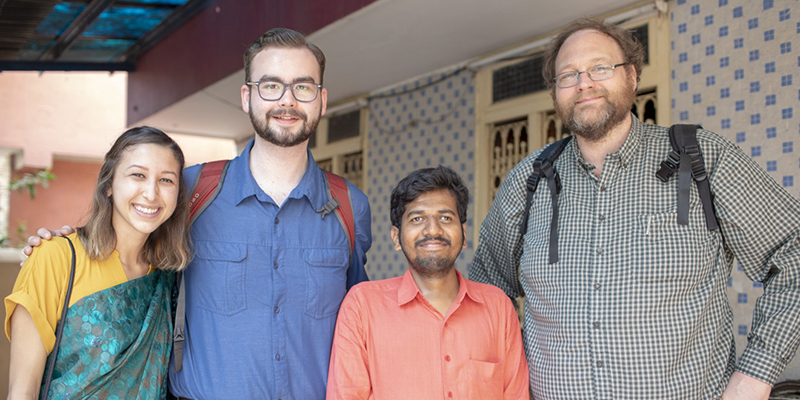

Excerpts from journal entries and emails to his kids.
You know how, when there is a big crowd of people all walking in different directions, that we just manage to move past each other and get where we’re going without bumping into one another. Driving in India is like that. There are no lanes. People just drive where they want to go. If someone is in your way, you honk. There is LOT of honking. For foreigners who are visiting, there is also a lot of screaming (Aiyeee!). There were a number of times today when I thought we were about to hit another vehicle but then, miraculously, just missed (Aiyeee!). I found it was best to just buckle my seatbelt and not look out the window. So I sat in the back of the bus.
Mentally disabled Indian children are very curious about white-skinned foreigners. Many of them came to say hello and shake our hands because they wanted to touch our skin to see if felt as strange as we looked. One little girl, about 4 years old, insisted on visiting each of us multiple times. She taught us a new gesture they use in India to tell someone they are beautiful.
One woman I met, named Rani, told a very good story. When she was three years old she lost her eyesight in an accident. In India, girls are considered a burden because they aren’t as good as boys. The neighbors told her parents, “You already have two other girls who are able-bodied. You should just get rid of your injured daughter.” Wow. But her parents did not listen. They sent her to Mission for the Blind. She learned to read and write in Braille. She learned how to use a computer even though she can’t see the monitor! She is so good at what she does, that she was hired by the school when she became an adult. She writes letters for the blind students and teaches them how to use the computers too. The school pays her a good salary. She saves the money and uses the extra to pay for her parents who are now too old to work. She also used the money to pay for her sister’s wedding. You see, instead of being a burden to her family, she is their greatest asset. It made me cry to hear her story.
Jobs are hard to get in India if you are a woman but Priscilla used to have a high paying job doing marketing research. She didn't feel fulfilled by it so she quit. After a year of living at home and doing nothing she finally had an inspiration and found Agape with a Google search. Now, she specializes in teaching mentally disabled students. She is also the most computer savvy person on the staff so she manages the website though she admits she doesn’t like being the “computer expert.” She says she always starts out hesitant to try new things but then ends up embracing it.
Religion in India is a particularly touchy subject because there are so many religions. Most people in India are Hindu. When you see a woman with a bindi (the painted dot) on her forehead that means she is a Hindu. I mentioned earlier about the castes in the Hindu religion and how lower castes are often treated poorly. Well Christians, like disabled people, are also considered to be lower than the lowest caste. So, being a Christian in India can be hard. David was telling us that he can’t make Agape officially a Christian organization because it would mean he might get less support from the community and the government.